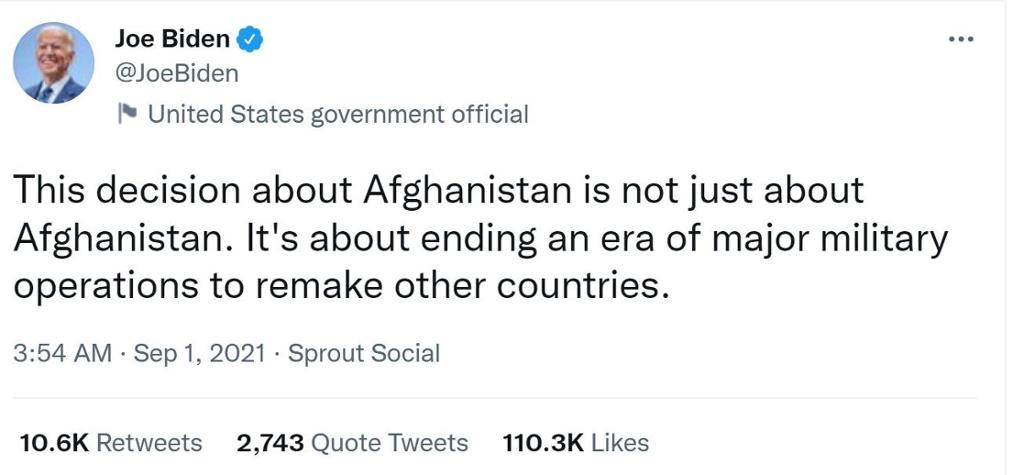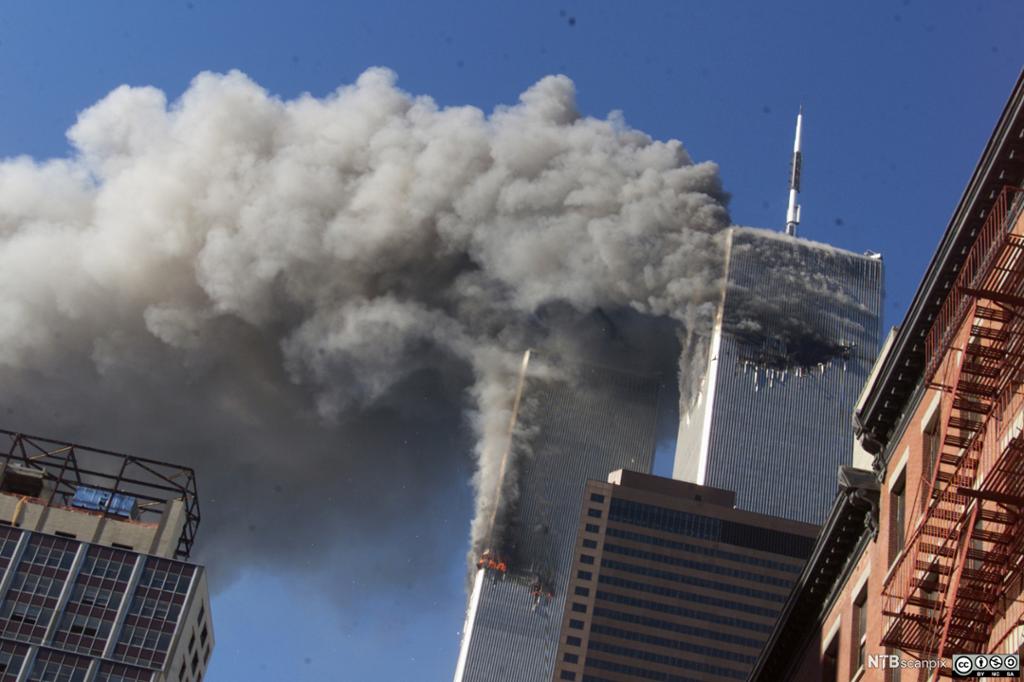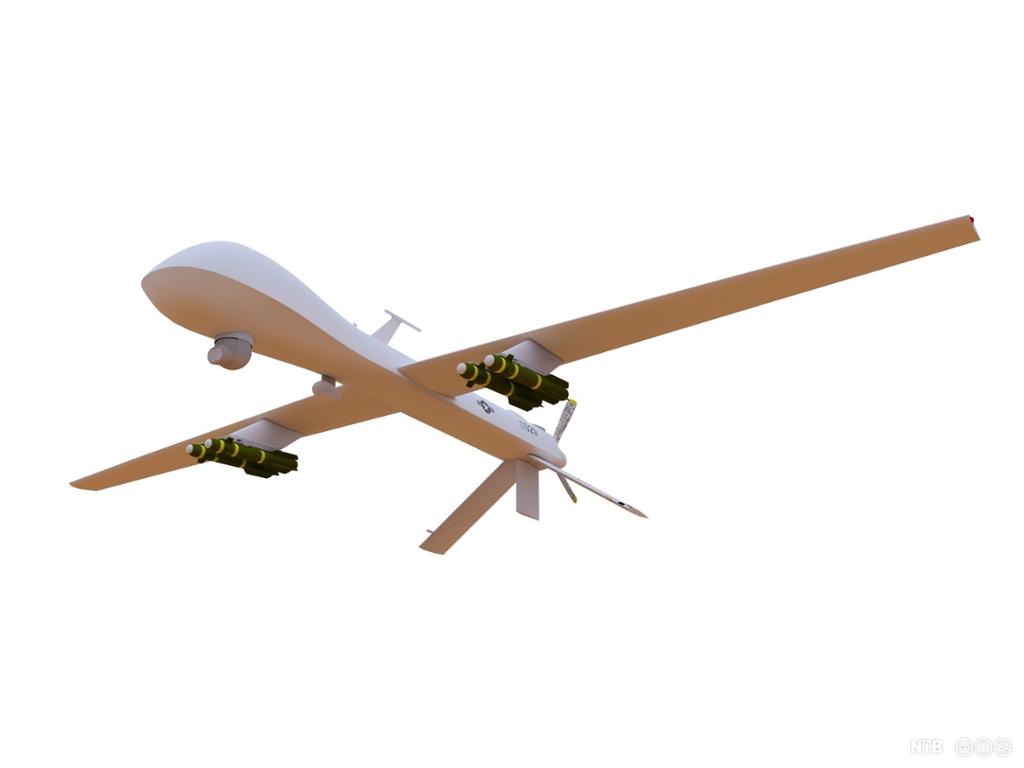A New Direction for America?
A New Direction for America?

The USA has a long history of engaging in military operations with the stated goal of preserving democracy and keeping America safe. During the Cold War it was America's goal to prevent the spread of communism. After the terrorist attacks against America on September 11, 2001, the United States' goal has been to remove safe havens for terrorists.
In 1823, President James Monroe issued a statement declaring that the USA would oppose any attempts to establish new colonies in the Americas. He also stated that the USA would not interfere with any existing colonies, or get involved in conflicts between European nations. This has become known as 'the Monroe Doctrine', and it would help shape the USA's foreign policy for many years to come. The USA had declared the Western Hemisphere as their area of interest. They wanted to curtail European colonialism, and ensure their own interests.
The USA's desire to stay out of European conflicts was evident in World War I, when the USA stayed out of the war until Germany began sinking American ships in 1917. By that point, the war had been raging in Europe since 1914. President Woodrow Wilson asked Congress for permission to declare war against Germany. He claimed it was necessary 'to make the world safe for democracy.'
After securing victory in World War I, the USA returned to a policy of isolationism – the US Senate even refused to sign the Treaty of Versailles, which formally ended the war.
The attack on Pearl Harbor in 1941 made it clear to America that ignoring European wars was a dangerous strategy. Japan's attack on the United States brought the USA into World War II. The USA emerged from the war as one of two super powers. A new world order was established, and the old Empires were collapsing. There was only one conflict that mattered: the Cold War between the Soviet Union and the USA.
Throughout World War II, the USA developed nuclear weapons, which were used against Japan to end the war. In 1949, the Soviet Union detonated their first atomic bomb, starting an arms race between the USA and the Soviet Union. Nuclear weapons were so destructive that it became imperative to avoid armed conflicts. If the USA and the Soviet Union did go to war against each other, even if the conflict began by using conventional weapons, it was inevitable that the conflict would escalate into a nuclear war. These weapons had the power to destroy countries, and the ensuing radiation would lay waste to the areas for generations. Over time the USA and the Soviet Union developed enough nuclear weapons to lay waste to the entire world.
The USA was a capitalist democracy, while the Soviet Union was a communist dictatorship. The USA feared that communism would spread from the Soviet Union to other countries. This lead to President Harry Truman pledging support, in the form of money or military assistance, to any countries that were fighting to resist communism. This has become known as the Truman Doctrine. The USA assumed the role of protector, defending themselves and the world against communism.
In the 1950s, the domino theory would come to strongly influence the USA's foreign policy decisions. The domino theory held that if one country became communist, the neighbouring countries would soon follow like falling dominoes.
The USA got involved in wars in Korea in the 1950s and Vietnam in the 1960s with the expressed intention of stopping the spread of communism. The USA also had a conflict with Cuba.
The Cold War knew no borders, and it influenced the USA's relationship with every other country. The USA created defence alliances around the world; NATO , SEATO, and ANZUS. The USA also supported CENTO, which was an alliance between the United Kingdom, Turkey, Iraq, Iran and Pakistan established in 1955 to prevent Soviet influence in the Middle East. Decisions were made to support governments, or to take support away from governments based on stopping the Soviet Union from gaining any influence. This meant that the USA came to support dictatorships simply because they were not communist dictatorships.
The USA's unpopularity in Islamic countries can be understood to have its roots in decisions made during the Cold War. The Middle East was important to the USA because of its wealth of oil resources, which the USA did not want the Soviet Union to gain control of. Their support of oppressive regimes caused great resentment. The USA also supported the creation of Israel. Establishing a Jewish state in a Muslim area was not well received by the neighbouring Muslim countries.
Starting in 1989, the world witnessed the collapse of the Soviet Union, which was dissolved in 1991. The USA was left as the only super power in the world.
In 1990 Iraq invaded Kuwait with the goal of securing the country's oil resources. The Gulf War was fought by an international coalition of 35 nations lead by the USA. President George Bush wanted to invade Iraq and remove the dictator Saddam Hussein, but he did not get international support for this proposal.
On 11 September 2001, the USA was attacked by Islamic terrorists from the organisation Al–Qaeda. Four passenger planes were hijacked – two hit the Twin Towers in New York, one hit the Pentagon, and one crashed into a field in Pennsylvania. More than 3000 people were killed in the attack.

In the aftermath of the attack, President George W. Bush began 'a war on terror'. Afghanistan was regarded as Al-Qaeda’s main base of operations, so a war was initiated against the country. The goal was to remove the terrorist-friendly Taliban government, thereby preventing future attacks on US soil. There was no evidence that Iraq had been involved in the attack, but President George W. Bush nevertheless argued that going to war against Iraq and removing the dictator, Saddam Hussein, would be a step towards increasing the safety of the USA.
The war on terror came to define the USA's foreign policy for the next twenty years. The USA engaged in armed conflicts in several different countries -in addition to this, an immense system of digital surveillance was developed, which was used to monitor not just the country's enemies, but its citizens and allies too.
In 2020, the USA spent 725 billion US dollars on defence. By comparison China spent 252 billion, while the Russian Federation spent 61.7 billion. In fact, the USA spends more on defence than the next 11 countries on the list combined. This means that the USA wields the largest military might in the world.
Outspending both allies and potential enemies to this extent made sense to a majority of Americans during the Cold War, when the enemy was clearly defined and nuclear war was an ever present danger. Today, many feel that the money could be better spent investing in the USA, and making lives better for citizens. People observe that if the defense budget was cut, even by a few percentages, it would be possible to provide free healthcare for all citizens, or ensure free education for all who want to study at college or university.
There has also been a steady growth of the use of private companies on government contracts in war zones. There is reason to be sceptical of this arrangement: should war be a business opportunity?

The USA leaving Afghanistan and President Joe Biden's claim that 'the USA is ending an era of major military operations to remake other countries' means a brand new direction for the USA. However, it is as yet unclear what this new direction will entail. Will it be a return to American isolationism, or will the USA find different ways to solve international conflicts? Is this merely the aspiration of one administration, or will this mark a lasting change in US foreign policy? Will there be a 'Biden Doctrine'? Will the USA permanently abandon its goal of making the world safe for democracy? These questions do not as yet have an answer. What seems clear is that the USA will be reluctant to engage in another armed conflict in the immediate future.
Guoskevaš sisdoallu
Tasks related to the article A New Direction for America?